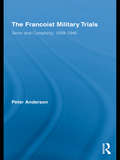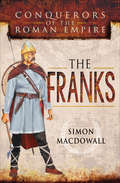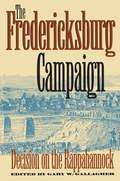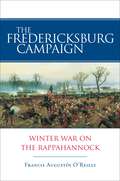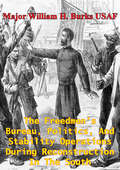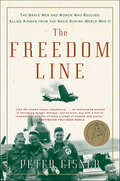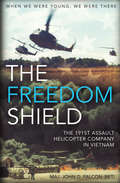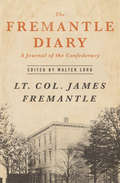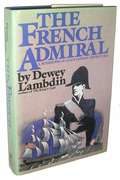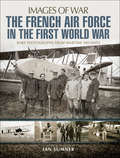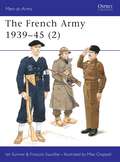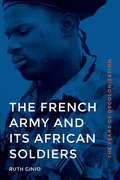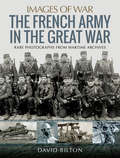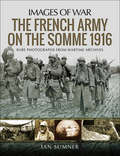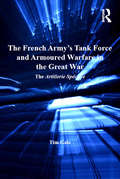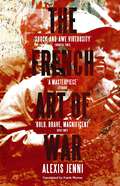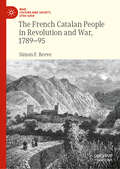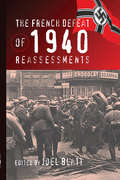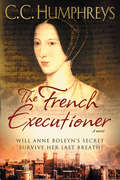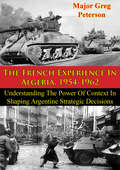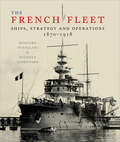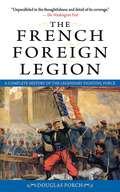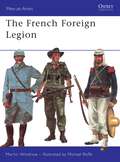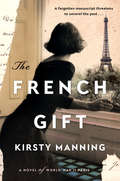- Table View
- List View
The Francoist Military Trials: Terror and Complicity,1939-1945 (Routledge/Canada Blanch Studies on Contemporary Spain #Vol. 17)
by Peter AndersonIn Spain between 1936-1945, the Franco regime carried out one Europe’s more brutal but less remembered programs of mass repression. Many were murdered by the regime’s death squads, and in some areas Francoists also subjected up to 15% of the population to summary military trials. Here many suffered the death sentence or jail terms up to thirty years. Although historians have recognised the staggering scale of the trials, they have tended to overlook the mass participation that underpinned them. In contrast to the discussion in other European countries, little attention has been paid to the wide scale collusion in the killings and incarcerations in Spain. Exploring mass complicity in the trials of hundreds of thousands of defeated Republicans following the end of the Spanish Civil War, The Francoist Military Trials probes local Francoists’ accusations whereby victims were selected for prosecution in military courts. It also shows how insubstantial and hostile testimony formed the bedrock of ‘investigations’, secured convictions, and shaped the harsh sentencing practices of Franco’s military judges. Using civil court records, it also documents how grassroots Francoists continued harassing Republicans for many years after they emerged from prison. Challenging the popularly prevalent view that the Franco regime imposed a police state upon a passive Spanish society, the evidence Anderson uncovers here illustrates that local state officials and members of the regime’s support base together forged a powerful repressive system that allowed them to wage war on elements of their own society to a greater extent than perhaps even the Nazis managed against their own population.
The Franks: The Franks (Conquerors of the Roman Empire)
by Simon MacDowallHow a relatively small group of Germans came to be overlords of all of the former Roman province of Gaul—giving their name to France in the process. Simon MacDowall studies the Frankish way of warfare and assesses its effectiveness, from their earliest incursions into the Empire, down to the Battle of Casilinum (554), their last battle against Romans, The size and composition of their armies, their weapons (including the characteristic Francisca axe), equipment, and tactics are discussed. In this tumultuous period, the Franks had a complex relationship with the Romans, being by turns invaders, recruits to the legions, and independent allies. Accordingly, this book also covers the Franks’ role in defending the Rhine frontier against subsequent invasions by the Vandals, Alans, Suebi, and the Huns. Their success in defending their new homeland against all comers allowed them, under the leadership of the Merovingian dynasty of Clovis, to establish the Frankish kingdom as one of the most enduring of the “barbarian” successors to the power of Rome.
The Fredericksburg Campaign
by Gary W. GallagherIt is well this is so terrible! We should grow too fond of it," said General Robert E. Lee as he watched his troops repulse the Union attack at Fredericksburg on 13 December 1863. This collection of seven original essays by leading Civil War historians reinterprets the bloody Fredericksburg campaign and places it within a broader social and political context. By analyzing the battle's antecedents as well as its aftermath, the contributors challenge some long-held assumptions about the engagement and clarify our picture of the war as a whole. The book begins with revisionist assessments of the leadership of Ambrose Burnside and Robert E. Lee and a portrait of the conduct and attitudes of one group of northern troops who participated in the failed assaults at Marye's Heights. Subsequent essays examine how both armies reacted to the battle and how the northern and southern homefronts responded to news of the carnage at Frederickburg. A final chapter explores the impact of the battle on the residents of the Fredericksburg area and assesses changing Union attitudes about the treatment of Confederate civilians. The contributors are William Marvel, Alan T. Nolan, Carol Reardon, Gary W. Gallagher, A. Wilson Greene, George C. Rable, and William A. Blair.This collection of seven original essays by leading Civil War historians reinterprets the bloody Fredericksburg campaign and places it within a broader social and political context. By analyzing the battle's antecedents as well as its aftermath, the contributors challenge long-held assumptions about the engagement and clarify our picture of the war as a whole. The contributors are William Marvel, Alan T. Nolan, Carol Reardon, Gary W. Gallagher, A. Wilson Greene, George C. Rable, and William A. Blair.-->
The Fredericksburg Campaign: Winter War on the Rappahannock
by Francis Augustín O'ReillyThe battle at Fredericksburg, Virginia, in December 1862 involved hundreds of thousands of men; produced staggering, unequal casualties (13,000 Federal soldiers compared to 4,500 Confederates); ruined the career of Ambrose E. Burnside; embarrassed Abraham Lincoln; and distinguished Robert E. Lee as one of the greatest military strategists of his era. Francis Augustín O'Reilly draws upon his intimate knowledge of the battlegrounds to discuss the unprecedented nature of Fredericksburg's warfare. Lauded for its vivid description, trenchant analysis, and meticulous research, his award-winning book makes for compulsive reading.
The Freedmen’s Bureau, Politics, And Stability Operations During Reconstruction In The South
by Major William H. Burks USAFThe United States' Civil War ended in 1865. However, the post-conflict period immediately following, known as Reconstruction, lasted another twelve years. This era provides a great case study to examine the impacts of politics on military stability operations. This paper studies the Freedmen's Bureau during its existence from 1865 to 1872. Envisioned as the lead organization for integrating former slaves into American society, the Bureau's efforts in the post-Civil War South were undermined by a hostile political situation at the national and state level and a diminishing lack of popular support throughout the entire nation to embrace radical social changes. The Bureau's operational timeframe splits into three distinct periods: conflict with President Andrew Johnson from 1865 to early 1867, revamped efforts during Congressional Reconstruction from early 1867 to the end of 1868, and a reduced operational focus (primarily education) from 1869 to 1872. The Bureau faced manning challenges and fought racism as it worked to help former slaves become self-sufficient, educated, and true citizens of the nation in which they resided. Unfortunately, hostile political conditions meant much of the civil rights work accomplished by the Bureau was subdued after its demise until the Civil Rights Movement in the 1960s.
The Freedom Line: The Brave Men and Women Who Rescued Allied Airmen from the Nazis During World War II
by Peter EisnerCompared to Casablanca by the Washington Post, The Freedom Line is a page-turning story of a group of resistance workers who secreted downed Allied fighter pilots through France and into safety in Spain during World War II—perfect for fans of Apple TV's Masters of the Air.As war raged against Hitler's Germany, an increasing number of Allied fliers were shot down on missions against Nazi targets in occupied Europe. Many fliers parachuted safely behind enemy lines only to find themselves stranded and hunted down by the Gestapo. The Freedom Line traces the thrilling and true story of Robert Grimes, a 20–year–old American B–17 pilot whose plane was shot down over Belgium on Oct. 20, 1943. Wounded, disoriented, and scared, he was rescued by operatives of the Comet Line, a group of tenacious young women and men from Belgium, France, and Spain who joined forces to rescue the Allied aircrews and take them to safety. And on Christmas Eve 1943, he and a group of fellow Americans faced unexpected sudden danger and tragedy on the border between France and Spain.The road to safety was a treacherous journey by train, by bicycle, and on foot that stretched hundreds of miles across occupied France to the Pyrenees Mountains at the Spanish border. Armed with guile and spirit, the selfless civilian fighters of the Comet Line had risked their lives to create this underground railroad, and by this time in the war, they had saved hundreds of Americans, British, Australians, and other Allied airmen.Based on interviews with the survivors and in–depth archival research, The Freedom Line is the story of a group of friends who chose to act on their own out of a deep respect for liberty and human dignity. Theirs was a courage that presumed to take on a fearfully powerful foe with few defences.
The Freedom Shield: The 191st Assault Helicopter Company in Vietnam
by Major John D. FalconA Vietnam War helicopter pilot shares arresting accounts of flying troops into hot LZs and medevacking the wounded under fire. The Freedom Shield brings together stories of veterans of the 191st Assault Helicopter Company, who were tasked with carrying troops into battle, attacking enemy positions, and evacuating the wounded in their UH-1 Iroquois &“Huey&” helicopters. The unit was assembled from a hodgepodge of hand-me-down aircraft, used equipment, and overlooked personnel—its appearance belied the invaluable work the crews of the 191st would undertake during the Vietnam War. This narrative of the Company, told through collected stories of veterans, defines a breed of soldier newly minted in Vietnam: the combat assault-helicopter crewman. The 191st pilots, crews, and support personnel vividly share the details of what it was like to be at war and forced to rely on your fellow crewmembers for your own survival. Their accounts of helicopter combat at the height of the Vietnam conflict accurately recreate the sights and sounds of the battlefields, the fear and horror of watching close friends torn to pieces, and their feelings on returning to base. Their message is infinitely clear: &“The price of freedom is painful.&” Praise for The Freedom Shield &“The story of the 191st Assault Helicopter Company&’s combat actions in Vietnam is one of heroism and dedication to duty. It is a vivid picture of young American soldiers full of P and V and the &“want to&” needed to get the job done with bullets flying in all directions. An adrenaline rush is the order of the day. Read this book to gain new respect and admiration for the Vietnam-era veterans who fought in this unpopular war—they were truly magnificent!&” —Brigadier General John C. &“Doc&” Bahnsen, author of American Warrior: A Combat Memoir of Vietnam &“An amazing story of perseverance and will. The author accurately chronicles how the 191st Assault Helicopter Company was assembled, during the haste of the Vietnam buildup, with secondhand equipment and filler personnel to become a crown jewel among aviation units in battle. A true testament of American mettle that we all still admire and envy.&” —Col. Alan B. Renshaw
The Fremantle Diary: A Journal of the Confederacy (Classics Of War Ser.)
by Lt. Col. James FremantleThe fascinating diary of English colonel James Fremantle, who spent three months behind Confederate lines at the height of the American Civil WarThree hours after stepping onto American soil, James Fremantle saw his first corpse: that of a bandit lynched for taunting Confederate officers. But Fremantle was not shocked by this grisly introduction to the Civil War. On leave from Her Majesty&’s army, the Colonel had come to tour the fight, and see firsthand the gallant Southerners about whom he had read. In the next three months, he witnessed some of the most monumental moments of the entire war. Starting on the war&’s western fringe, Fremantle worked his way east, arriving on the Confederate lines in time for Gettysburg, which he watched with a telescope in a tree outside the tent of General Hood. Along the way he met Robert E. Lee, P. G. T. Beauregard, Jefferson Davis, and nearly every other Confederate leader at the time. Including an insightful introduction and notes by bestselling author Walter Lord, The Fremantle Diary is an elegant memoir and intimate portrait of one of the nation&’s most savage conflicts.
The French Admiral (Alan Lewrie Naval Adventures #2)
by Dewey LambdinMidshipman Alan Lewrie disembarks from the frigate H.M.S. "Desperate" to take part in the fierce land battle at Yorktown, where he meets the Chiswick brothers and their lovely sister and uncovers clues to his mysterious past.
The French Air Force in the First World War: Rare Photographs From Wartime Archives (Images of War)
by Ian SumnerThe French air force of the First World War developed as fast as the British and German air forces, yet its history, and the enormous contribution it made to the eventual French victory, is often forgotten. So Ian Sumner's photographic history, which features almost 200 images, most of which have not been published before, is a fascinating and timely introduction to the subject. The fighter pilots, who usually dominate perceptions of the war in the air, play a leading role in the story, in particular the French aces, the small group of outstanding airmen whose exploits captured the publics imagination. Their fame, though, tends to distract attention from the ordinary unremembered airmen who formed the body of the air force throughout the war years. Ian Sumner tells their story too, as well as describing in a sequence of memorable photographs the less well-known branches of the service the bomber and reconnaissance pilots and the variety of primitive warplanes they flew.
The French Army 1939-45
by Mike Chappell Ian SumnerBy 16 June 1940, De Gaulle, with the decisive support of Churchill, had come to the conclusion that, whatever happened, France could not stand to one side in the struggle against Nazi Germany. And so, Free France was born. In this companion volume to MAA 315: The French Army 1939-45 (I) , Ian Sumner and François Vauvillier examine the history, uniforms and insignia of the Free French, Fighting French and the Army of Liberation during World War II (1939-1945).
The French Army and Its African Soldiers: The Years of Decolonization (France Overseas: Studies in Empire and Decolonization)
by Ruth GinioAs part of France’s opposition to the independence of its former colonies in the years following World War II, its army remained deeply invested in preventing the decolonization of the territories comprising French West Africa (FWA). Even as late as the 1950s, the French Army clung to the hope that it was possible to retain FWA as a colony, believing that its relations with African soldiers could offer the perfect model for continued ties between France and its West African territories. In The French Army and Its African Soldiers Ruth Ginio examines the French Army’s attempts to win the hearts and souls of the local population at a time of turbulence and uncertainty regarding future relations between the colonizer and colony. Through the prism of the army’s relationship with its African soldiers, Ginio considers how the army’s activities and political position during FWA’s decolonization laid the foundation for France’s continued active presence in some of these territories after independence. This project is the first thorough examination of the French Army’s involvement in West Africa before independence and provides the essential historical background to understanding France’s complex postcolonial military relations with its former territories in Africa.
The French Army and the First World War
by Elizabeth GreenhalghThis is a comprehensive new history of the French army's critical contribution to the Great War. Ranging across all fronts, Elizabeth Greenhalgh examines the French army's achievements and failures and sets these in the context of the difficulties of coalition warfare and the relative strengths and weaknesses of the enemy forces it faced. Drawing from new archival sources, she reveals the challenges of dealing with and replenishing a mass conscript army in the face of slaughter on an unprecedented scale, and shows how, through trials and defeats, French generals and their troops learned to adapt and develop techniques which eventually led to victory. In a unique account of the largest Allied army on the Western Front, she revises our understanding not only of wartime strategy and combat, but also of other crucial aspects of France's war, from mutinies and mail censorship to medical services, railways and weapons development.
The French Army in the Great War (Images of War)
by David BiltonA history of the fighting and day-to-day lives of French soldiers on the Western Front in World War I, filled with rare archival photos. Few books have been written in English about the French Army during the Great War, and those that exist feature very few illustrations. This book aims to provide a highly readable and succinct account of the work of the French Army on the Western Front, as well as provide the reader with a wealth of photographs that show the daily life of the French soldier both in and out of the trenches. All of the images are contemporary, many coming from wartime and postwar magazines, interspersed with many previously unpublished images. The book aims to give a concise overview of the war seen through French eyes and includes the casualties incurred. Although the May 1917 mutinies were an important but brief part of the story, they are not dealt with at length because they can distract from the main story of the valor shown by the French troops in battles where the casualties were extremely high. Also included is a lengthy introduction that explains the structure of the army at the onset of the war and some of the problems it faced, as well as a section that looks at the uniforms worn and how they changed during the war.
The French Army on the Somme 1916 (Images of War)
by Ian SumnerSo much has been written about the 1916 Battle of the Somme that it might appear that every aspect of the four-month struggle has been described and analyzed in exhaustive detail. Yet perhaps one aspect has not received the attention it deserves the French sector in the south of the battlefield which is often overshadowed by events in the British sector further north. That is why Ian Sumner's photographic history of the French army on the Somme is so interesting and valuable.Using a selection of over 200 wartime photographs, many of which have not been published before, he follows the entire course of the battle from the French point of view. The photographs show the build-up to the Somme offensive, the logistics involved, the key commanders, the soldiers as they prepared to go into action and the landscape over which the battle took place. Equally close coverage is given to the fighting during each phase of the offensive the initial French advances, the mounting German resistance and the terrible casualties the French incurred.The photographs are especially important in that they record the equipment and weapons that were used, the clothing the men wore and the conditions in which they fought, and they provide us with a visual insight into the realities of battle over a hundred years ago. They also document some of the most famous sites on the battlefield before they were destroyed in the course of the fighting, including villages like Gommecourt, Pozires, La Boiselle and Thiepval.
The French Army's Tank Force and Armoured Warfare in the Great War: The Artillerie Spéciale (Routledge Studies in First World War History)
by Tim GaleRecent scholarship has challenged the assumption that military commanders during the First World War were inflexible, backward-looking and unwilling to exploit new technologies. Instead a very different picture is now emerging of armies desperately looking to a wide range of often untested and immature scientific and technological innovations to help break the deadlock of the Western Front. Nowhere is this better illustrated than in the development of tank warfare, which both the British and the French hoped would give them a decisive edge in their offensives of 1917 and 1918. Whilst the British efforts to develop armoured warfare have been well chronicled, there has been no academic study in English on the French tank force - the Artillerie Spéciale - during the Great War. As such, this book provides a welcome new perspective on an important but much misunderstood area of the war. Such was the scale of the French tanks’ failure in their first engagement in 1917, it was rumoured that the Artillerie Spéciale was in danger of being disbanded, yet, by the end of the war it was the world’s largest and most technologically advanced tank force. This work examines this important facet of the French army’s performance in the First World War, arguing that the AS fought the war in as intelligent and sensible a manner as was possible, given the immature state of the technology available. No amount of sound tank doctrine could compensate for the fragility of the material, for the paucity of battlefield communication equipment and for the lack of tank-infantry training opportunities. Only by 1918 was the French army equipped with enough reliable tanks, as well as aircraft and heavy-artillery, to begin to exercise a mastery of the new form of combined-arms warfare. The successful French armoured effort outlined in this study (including a listing of all the combat engagements of the French tank service in the Great War) highlights a level of military effectiveness within
The French Art of War
by Alexis JenniIt was the beginning of the Gulf War. I watched it on TV and did little else. I was doing badly, you see. Everything was going wrong. I just awaited the end. But then I met Victorien Salagnon, a veteran of the great colonial wars of Indochina, Vietnam and Algeria, a commander who had led his soldiers across the globe, a man with the blood of others up to his elbows. He said he would teach me to paint; he must have been the only painter in the French Forces, but out there no one cares about such things. I cared, though. In return, he wanted me to write his life story. And so he talked, and I wrote, and through him I witnessed the rivers of blood that cut channels through France, I saw the deaths that were as numberless as they were senseless and I began finally to understand the French art of war.
The French Catalan People in Revolution and War, 1789-95 (War, Culture and Society, 1750–1850)
by Simon F. ReeveThis book examines the effect of the French Revolution and the ensuing war with Spain on northern Catalonia, annexed by France in the seventeenth century and constrained by the imposition of a political border along the Pyrenees. Assimilation of the northern Catalan people into France had been slow; by 1789, the Catalan-speaking majority remained stubbornly linked to their ethnic counterparts south of the Pyrenees. This work examines how confrontation between national and local allegiances played out as the French Revolutionary leadership propagated the concept of the nation state and challenged deeply-held traditional religious beliefs. Using detailed analysis of contemporary local sources, it illustrates the impact of geographic and ethnic ties within a historically insular region on the wider conflict between France and Spain. Local communities reacted, often in dramatically different ways, to being the frontline of an existential national war. French Catalans were forced into taking sides, some from conviction with others acting more pragmatically. Many chose to cross the frontier to Spain to escape persecution and retribution, only to return later when events allowed. Although weakened since annexation, the persistence of Catalan identity and loyalties remained a hugely significant factor in determining the course of the Revolution in this region.
The French Defeat Of 1940: Reassessments
by Joel BlattWhy France, the major European continental victor in 1918, suffered total defeat in six weeks at the hands of the vanquished power of 1918 only two decades later remains moot. Why the stunning reversal of fortunes? In this volume thirteen prominent scholars reexamine the French debacle of 1940 in interwar perspectives, utilizing fresh analysis, original approaches, and new sources. Although the tenor of the volume is critical, the contributors also suggest that French preparations for war knew successes as well as failures, that French defeat was not inevitable, and that the Battle of France might have turned out differently if different choices had been made and other paths been followed.
The French Executioner
by C. C. HumphreysThe last thing Jean Rombaud expects upon being summoned to behead Anne Boleyn is to dedicate his life to her. But the ill-fated queen has a mysterious request for her executioner: that after taking her life he also take her infamous six-fingered hand and bury it at a sacred crossroads in France. His oath will set Jean on the most dangerous journey of his life.In The French Executioner, C.C. Humphreys once again brings the past to life in all its glory and peril. This thrilling novel captures the breathtaking story of how courage, love, and loyalty bound Anne Boleyn to the man who ended her life--and saved her legacy."Humphreys has fashioned a rollicking good yarn that keeps the pages turning from start to finish."--Irish Examiner"A wonderful saga of magic and heroism. If you can find a first impression, hoard it and wait till it rises in value like a first edition of Lord of the Rings. This is as good."--Crime Time, UK"A brilliant, brutal, and absorbing historical thriller on the real-life figure of Jean Rombaud, the man who beheaded Anne Boleyn."--Northern Echo"An entertaining read--a charming page turner."--Edmonton Journal"Lightning paced."--Publishing News
The French Experience In Algeria, 1954-1962: Blueprint For U.S. Operations In Iraq
by Major Greg PetersonIn 1954 the French Armed Forces began a campaign in Algeria against the insurgent Front de Liberation Nationale (FLN) which had started a bloody uprising against French sovereignty. Initially, the French military did not have a viable counterinsurgency doctrine that was effective in defeating the FLN and destroying its network. It took them four years of trial and error to develop a doctrine and operational concept able to defeat the FLN inside Algeria and prevent outside assistance from reconstituting the FLN. By 1960 it was apparent the FLN could not win the liberation of Algeria militarily. However, the political situation respective to France and Algeria internally and internationally by then had changed to the point that military operations in the field were not going to affect the political outcome in Algeria. The French Armed Forces took too long to adopt an effective doctrine to combat the insurgent threat and by the time they were effective it was irrelevant.Currently the U.S. is in occupation of Iraq and exercising sovereignty in that state. The U.S. Armed Forces are conducting counterinsurgency operations to defeat and dismantle the Former Regime Loyalists and various Islamic fundamentalist organizations inside the country. U.S. Armed Forces do not have an overarching counterinsurgency doctrine that is applicable to their operations in Iraq and similar to the French in Algeria they are going through a learning process. It is the author's assertion that by studying the French experience in Algeria the U.S. Armed Forces can learn from the mistakes and victories of the French and hasten the learning process for counterinsurgency operations in Iraq. The French experience in Algeria demonstrates what can happen when a military takes too long to adapt to a changed battlefield.
The French Fleet: Ships, Strategy and Operations 1870–1918
by Ruggero Stanglini Michele ConsentinoAt the end of the 1870-1 Franco-Prussian war, the French Navy began to reconstruct its fleet, replacing old generation warships with steam-powered and iron-hulled men-of-war. However, the process was slow and erratic since priority was initially given to the Army. Additionally, the establishment of the Third Republic led to a long period of political and economic instability which affected naval and shipbuilding policy. French naval yards and private shipyards were committed to build a fleet of ironclads, cruisers and minor vessels and led France to become the second European naval power, at least quantitatively. The rise of the ‘Jeune Ècole’ (Young School) strategic naval concept in the early 1880s then changed shipbuilding priorities, and emphasis was given to coastal torpedo boats and cruisers while the construction of battleships was slowed. As a consequence, the French Navy implemented the dreadnought concept later than other European naval powers, namely Great Britain and Germany. The 1904 Entente Cordiale contributed to yet further radical changes to foreign, naval and shipbuilding policies, so that at the outbreak of World War One the French fleet was populated with limited dreadnoughts, many obsolete armored cruisers, an impressive array of torpedo boats and a fleet of submarines whose efficiency was however questionable. The book provides a complete overview of the French Navy from the establishment of the Third Republic to the end of World War One. French foreign and naval policy, shipyards and industrial organization, technological innovations, operations and shipbuilding programs are all described in the first part of the volume, while the second and larger part is focused on the different categories of warships, including their qualitative and quantitative evolution during the period of 1871–1918 and their employment during the Great War. A chapter is also dedicated to naval aviation. Superbly illustrated with rare and carefully selected photographs, this major new reference book paints a clear and detailed overview of the French navy during this era and will stand as a vital companion to French Warships in the Age of Steam 1859–1914 published by Seaforth.
The French Foreign Legion
by Douglas PorchThe French Foreign Legion is a complete, captivating study of the famed fighting force, from its inception in 1831 to modern times. Historian Douglas Porch chronicles the Legion's involvement in Spain, Mexico, Indochina, Madagascar, WWI, Vietnam, and Algiers (to name a few) and delves into the inner workings of legionnaires and their captains. Known for draconian discipline and shrouded in mystery, the secrets of the Legion are guarded by those who have gained admittance into its elite society. In this thoroughly researched and impressive account, Porch reveals the mysteries surrounding a Legion of "unparalleled exoticism, pathos, and drama."
The French Foreign Legion
by Martin Windrow Michael RoffeIt is arguable that no group of fighting men in the history of European arms has been so misrepresented by ill-informed publicity as the French Foreign Legion. Though initially conceived in 1831 as a means of drafting recently discharged foreign soldiers to Algeria, the Legion has developed into a sophisticated force of motorized infantry, airborne troops and light armor. In this book, acclaimed French Army expert Martin Windrow examines the history and uniforms of the French Foreign Legion, from its service in the Carlist War of 1835-36 to World War II and beyond, debunking many of the prevalent myths surrounding this formidable force.
The French Gift: A Novel of World War II Paris
by Kirsty ManningFrom Kirsty Manning, author of The Song of the Jade Lily, comes a gripping World War II set historical novel about murder, secrets, and survival. A forgotten manuscript that threatens to unravel the past… Fresne Prison, 1940: A former maid at a luxury villa on the Riviera, Margot Bisset finds herself in a prison cell with writer and French Resistance fighter Joséphine Murant. Together, they are transferred to a work camp in Germany for four years, where the secrets they share will bind them for generations to come. Paris, around about now: Evie Black lives in Paris with her teenage son, Hugo, above her botanical bookshop, La Maison Rustique. Life would be so sweet if only Evie were not mourning the great love of her life. When a letter arrives regarding the legacy of her husband’s great-aunt, Joséphine Murant, Evie clutches at an opportunity to spend one last magical summer with her son. They travel together to Joséphine’s house, now theirs, on the Côte d’Azur. Here, Evie unravels the official story of this famous novelist, and the truth of a murder a lifetime ago. Along the way, she will discover the little-known true story of the women who were enslaved by German forces in WWII. Bringing together the present and the past, The French Gift is a tender and heartbreaking story of female friendship, sacrifice and loss, and the promise of new love.
